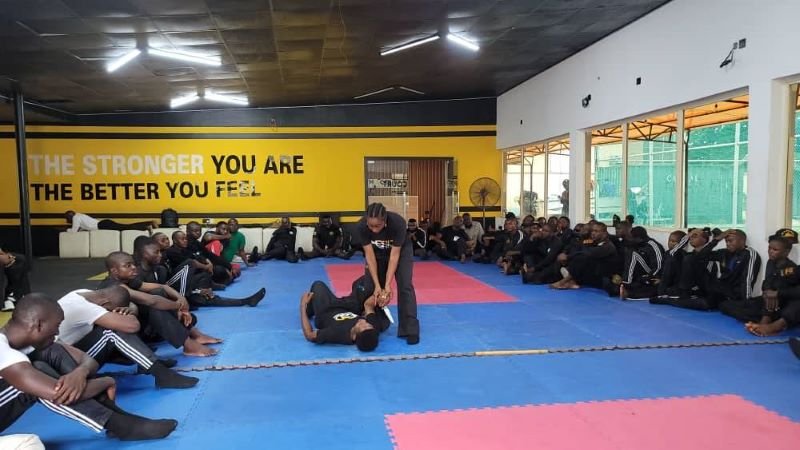WHEN General Christopher Musa, Nigeria’s Chief of Defence Staff, recently urged citizens to embrace self-defence and survival training, his words sparked conversations that cut across security, law, gender rights, and daily survival. News Point Nigeria explores these diverse viewpoints.
The remarks, delivered during an interview on Channels Television’s Politics Today, ignited national debate, prompting clarification from the Defence Headquarters and sparking fresh conversations on insecurity, resilience, and survival in today’s Nigeria.
General Musa stressed that knowing how to defend oneself is just as essential as learning how to drive or swim. “That one should be taken as learning driving, learning how to swim.
“Whether we have war or not, it is a survival instinct,” he said. “In Europe, swimming is compulsory. Learning and teaching about security is also compulsory because you have to learn what security is.”
The comments, however, were misinterpreted in some quarters as a call for Nigerians to arm themselves. The Defence Headquarters quickly issued a statement clarifying that the CDS did not, at any point, encourage citizens to bear arms or unlawfully possess firearms.
Brigadier General Tukur Gusau, Director of Defence Information, explained: “The CDS only encouraged Nigerians to acquire basic survival and self-protection skills such as driving, swimming, taekwondo, judo and boxing. For the avoidance of doubt, the CDS did not call for citizens to bear arms.”
The Defence Chief’s message has found resonance in many communities. For years, martial arts trainers, NGOs, and women’s rights groups have been calling for structured self-defence education as crime and insecurity grow.
Former Ondo State First Lady, Betty Anyanwu-Akeredolu, openly supported the CDS’s remarks. Through her BEMORE Empowered Girls Foundation, she introduced taekwondo training to girls as early as 2017.
“Rising cases of rape and gender-based violence pushed us to introduce taekwondo at our annual boot camp. Our girls have gained not just physical strength, but confidence, courage, and resilience,” she wrote on X (formerly Twitter).
For Rasheed Olaniyi, a former competitive martial artist who switched to teaching self-defence, the need is beyond urgent.
“I once had to defend myself against three attackers in Lagos. That experience showed me how essential self-defence is. Today, I focus on teaching speed, accuracy, and strength not just competition tactics, but skills people can apply in real-life situations.”
The insecurity crisis; kidnappings, armed robbery, phone snatching, and gender-based violence has forced many Nigerians to reconsider self-defence not as a luxury, but as a necessity.
Sadiya Kaltungo, a chef and survivor of domestic violence, recalled how learning combat skills turned her life around. “My husband used to beat me, but when I started applying self-defence techniques, the violence stopped. He began going to work with a swollen eye too.”
A popular Kannywood actress, who asked not to be named, said self-defence could have saved her from a rape incident in Kaduna. “If I had this training earlier, I wouldn’t have been assaulted.”
Angela Idu, a Lagos hairstylist, highlighted the importance of awareness. “It’s not just about throwing punches; it’s about knowing how to react and not putting yourself in harm’s way.”
Adeola Olamide, a mother of three, joined classes in Abuja after repeated assaults. “At least, I can now protect myself. I no longer feel helpless.”
While many embrace the idea, experts warn against reckless use. Social media influencer Olu Akindele cautioned: “Sometimes the smartest move is not to fight back especially if you’re outnumbered or facing armed attackers. Self-defence must be applied with wisdom.”
NGOs are also stepping in. KickBack Events, an advocacy group, runs free crash courses for women and children. Coordinator Steve Joseph explained: “We were motivated by the rise in serial killings and rape cases. We are not teaching people to attack, but to defend themselves and get out of dangerous situations.”
Nigeria’s laws back the right to self-defence. Section 33(2)(a) of the 1999 Constitution allows the use of “reasonably necessary” force to defend oneself, others, or property. The Criminal Code (South) and Penal Code (North) further outline this principle, emphasizing necessity, proportionality, and reasonableness.
Courts have also upheld self-defence as a complete justification in cases like Uwaekweghinya v. The State. However, judges stress that once a threat subsides, excessive force cannot be justified.
For many Nigerians, General Musa’s call has reignited awareness that survival goes beyond waiting for the military or police. While the Armed Forces continue to fight insurgency and criminal gangs, citizens are increasingly recognizing the need to take responsibility for their own safety.
Self-defence, whether in a dojo, at a women’s camp, or in informal neighbourhood classes is no longer just about fitness. It has become a language of resilience, empowerment, and survival in an uncertain Nigeria.
As one Abuja security guard, Moshood Nuraideen, put it: “Sometimes when people scream for help at night, we arrive too late. That’s why we advise everyone to take self-defence classes or at least carry pepper spray. The streets are tough, you need to toughen up too.”







